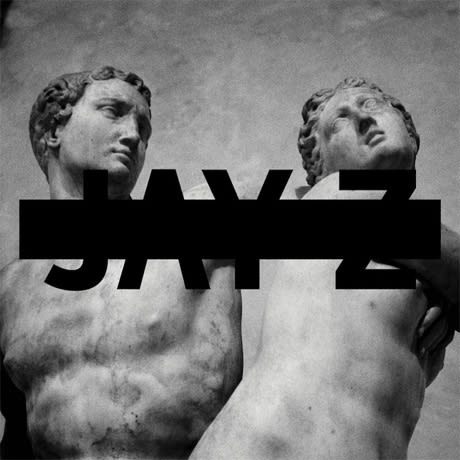It's hard, or pretty damn near impossible, to discuss Jay-Z's 12th studio album without mentioning the unprecedented deal brokered between the superstar MC and Samsung to distribute it. While the bemusing incongruity of Jay-Z instructing Miley Cyrus to twerk has dominated early reactions to the Hit Boy-helmed "Somewhereinamerica," the song is also notable for its numerous references to the smartphone deal.
In Jay-Z's world, as he's often proven in the past, the tension between art and commerce isn't one to problematize or balance; in his mind, it represents a logical and necessary synthesis. On "Picasso Baby," he revels in the delivery of the syllables of every art gallery allusion (Jean-Michel Basquiat, in particular, gets a significant amount of attention), acknowledging opulent wealth and creativity in one fell stroke. The infectious and raucous "BBC" finds Jay in a philanthropic mood, presumably titling the track to give some attention to track co-producer Pharrell's clothing line.
Consequently, "Jay-Z Blue" isn't only a number meant to give us an introspective glimpse into Jay-Z as a parent to daughter Blue Ivy, it's also meant to remind us that Jay-Z once developed the colour Jay-Z Blue with car company General Motors. Jay-Z, who isn't suffering any significant flow or vocabulary rust, works predominantly with Timbaland and J-Roc on this outing (although he finds room for Wundagurl, a 16-year-old female producer from Brampton, ON, on "Crown"); he is acutely aware that any model or product needs to update and adapt to trends while also retaining its core appeal. Needless to say, he applies this approach to Magna Carta Holy Grail.
Accordingly, Jay-Z co-opts and redefines current trends to reassert his ongoing cultural potency. On "Tom Ford," hashtags and retweets get the throwback jersey treatment ("140 characters in these streets"), while the title indulges in search engine link-baiting. Meanwhile, he sagely selects beats to assuage those Reasonable Doubt heads stuck in the '90s, with the aforementioned "Picasso Baby" functioning as a sonic dog whistle to Vol. 3's gritty "So Ghetto," and "Heaven" sounding like a long-lost Wu-Tang instrumental somehow bereft of an Inspectah Deck verse (shout-out to fast-rising multi-instrumentalist/producer Adrian Younge, who Timbaland samples on both tracks).
The latter number indulges in religious allegory, and is one of the few songs that touch upon existential and spiritual themes. Replete with a poignant Frank Ocean cameo, "Oceans" uneasily posits champagne-soaked yacht excursions against the Middle Passage, while Justin Timberlake's centre stage wails anchor the musings on the duplicitous, yet seductive allure of fame on "Holy Grail."
The thoughts on the rarefied spaces Jay-Z negotiates were often the revelatory aspects of Kanye collaboration Watch the Throne and he revisits them here, often casting himself as an everyman in an extraordinary position. How much you believe of how conflicted and angst-ridden he actually is depends upon what you already think of Jay-Z, and could be up for debate. What can't be questioned, however, is that it is definitely good for business.
(Universal)In Jay-Z's world, as he's often proven in the past, the tension between art and commerce isn't one to problematize or balance; in his mind, it represents a logical and necessary synthesis. On "Picasso Baby," he revels in the delivery of the syllables of every art gallery allusion (Jean-Michel Basquiat, in particular, gets a significant amount of attention), acknowledging opulent wealth and creativity in one fell stroke. The infectious and raucous "BBC" finds Jay in a philanthropic mood, presumably titling the track to give some attention to track co-producer Pharrell's clothing line.
Consequently, "Jay-Z Blue" isn't only a number meant to give us an introspective glimpse into Jay-Z as a parent to daughter Blue Ivy, it's also meant to remind us that Jay-Z once developed the colour Jay-Z Blue with car company General Motors. Jay-Z, who isn't suffering any significant flow or vocabulary rust, works predominantly with Timbaland and J-Roc on this outing (although he finds room for Wundagurl, a 16-year-old female producer from Brampton, ON, on "Crown"); he is acutely aware that any model or product needs to update and adapt to trends while also retaining its core appeal. Needless to say, he applies this approach to Magna Carta Holy Grail.
Accordingly, Jay-Z co-opts and redefines current trends to reassert his ongoing cultural potency. On "Tom Ford," hashtags and retweets get the throwback jersey treatment ("140 characters in these streets"), while the title indulges in search engine link-baiting. Meanwhile, he sagely selects beats to assuage those Reasonable Doubt heads stuck in the '90s, with the aforementioned "Picasso Baby" functioning as a sonic dog whistle to Vol. 3's gritty "So Ghetto," and "Heaven" sounding like a long-lost Wu-Tang instrumental somehow bereft of an Inspectah Deck verse (shout-out to fast-rising multi-instrumentalist/producer Adrian Younge, who Timbaland samples on both tracks).
The latter number indulges in religious allegory, and is one of the few songs that touch upon existential and spiritual themes. Replete with a poignant Frank Ocean cameo, "Oceans" uneasily posits champagne-soaked yacht excursions against the Middle Passage, while Justin Timberlake's centre stage wails anchor the musings on the duplicitous, yet seductive allure of fame on "Holy Grail."
The thoughts on the rarefied spaces Jay-Z negotiates were often the revelatory aspects of Kanye collaboration Watch the Throne and he revisits them here, often casting himself as an everyman in an extraordinary position. How much you believe of how conflicted and angst-ridden he actually is depends upon what you already think of Jay-Z, and could be up for debate. What can't be questioned, however, is that it is definitely good for business.
